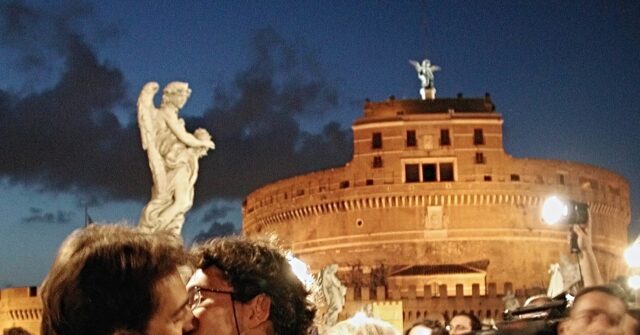The Vatican recently removed an LGBTQ+ pilgrimage event from its official Jubilee 2025 calendar, a decision that garnered significant attention after reports surfaced from Breitbart News and other outlets. Initially planned for September 6, this pilgrimage was set to be a groundbreaking event specifically tailored for Catholic homosexuals and LGBT individuals, despite the Catholic Church’s longstanding teachings condemning homosexual acts as immoral. The pilgrimage was spearheaded by Jonathan’s Tent, an Italian pro-LGBTQ+ organization that advocates for reconciling homosexuality with faith. Although the Vatican has officially struck the event from its calendar, Jonathan’s Tent continues to promote it on their website, emphasizing that the Vatican had accepted their request for an official pilgrimage aimed at “LGBT+ believers, their families, and their pastoral workers.”
Despite the Vatican’s attempt to erase this event from its listings, many believe it will proceed as planned. The pilgrimage will kick off with a vigil service on September 5, hosted at the Jesuit Church of the Gesù, which is the burial site of St. Ignatius of Loyola. Following this vigil, the LGBTQ+ pilgrims are expected to pass through the Holy Door of St. Peter’s Basilica and return to the Gesù Church for a Mass officiated by Bishop Francesco Savino, the vice president of the Italian Bishops’ Conference. These events suggest that the pilgrimage may have substantial support within certain factions of the Church, despite official Vatican disapproval.
In light of the developments surrounding the Jubilee 2025 pilgrimage, reactions from conservative factions within the Church have been pronounced. Bishop Joseph Strickland, who was ousted from his Texas diocese by Pope Francis, has been particularly vocal, urging prayers for the Pope’s “conversion” in response to the Vatican’s initial approval of the LGBTQ+ event. Strickland argues that the event contradicts the Gospel, expressing concern that the Church risk leading individuals “into darkness.” His outcry reflects the ongoing struggle between conservative and progressive elements within the Church, especially regarding LGBTQ+ issues.
Among those appointed as new cardinals by Pope Francis recently is Timothy Radcliffe, a pro-LGBTQ+ Dominican friar. Radcliffe is known for his progressive stance and has fervently supported causes aimed at rehabilitating the Church’s approach to homosexuality and homosexuals. His controversial views have included the insistence that there is potential for evolving Catholic moral teachings to become more inclusive. Radcliffe has previously argued against the ban on admitting men with homosexual tendencies to seminaries, claiming, “I have no doubt that God does call homosexuals to the priesthood.” He emphasizes that the Church should acknowledge the diverse vocations of homosexual individuals while advocating acceptance and understanding.
Radcliffe’s views on the intersection of faith and LGBTQ+ identities have continued to stir debate. He has claimed that acting against someone strictly based on their sexual orientation is wrong, insisting that the Church should embrace gay people and provide them support as they navigate their faith. His ideas challenge traditional Catholic perspectives that view homosexuality as inherently sinful. In a 2006 address, Radcliffe urged the Church to engage actively with the LGBTQ+ community through shared experiences, like watching films and reading literature that resonate with gay identities. His progressive views further suggest that erotic love can be seen as “Eucharistic” if framed within mutual respect and self-gift.
The ongoing discourse within the Catholic Church regarding LGBTQ+ issues reflects a deeper tension about the future of Church doctrine and the readiness to adapt to changing societal perspectives. Prominent figures like Radcliffe advocate for a reevaluation of the Church’s teachings, suggesting that it must not only respond to the realities of modern life but also embrace a broader understanding of love and relationships grounded in mutual fidelity and respect. As institutions grapple with the implications of these evolving dynamics, the efforts to reconcile faith with LGBTQ+ identities remain a contentious but vital conversation, reflecting a broader struggle over the Church’s values and teachings in an increasingly diverse world.

